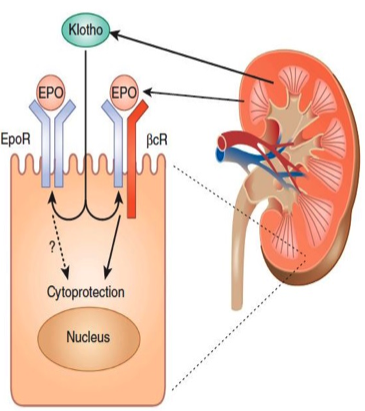Erythropoietin (EPO) is a glycoprotein hormone in the superfamily of cytokine receptors. It was originally characterized as regulating erythropoiesis by inhibiting apoptosis. EPO influences cells via the EPO receptor (EpoR), which is expressed in non-hematopoietic tissues such as the brain, heart, lung, and kidney. The EPO and EpoR interaction has been proposed to participate in biological processes such as cell proliferation, apoptosis, angiogenesis, and cytoprotection against ischemia.
We first proposed that EpoR is a downstream signaling component involved in Klotho’s cytoprotective effect. We have documented that functional EpoR exists in the kidney, and that deletion of EpoR lends to severe tissue damage, slow tissue regeneration, and reduced angiogenesis after ischemia in our mouse models. We have further proven that Klotho modulates the expression of EpoR transcript, protein, and function in kidney.
We are using several murine lines with genetic manipulation of EpoR activity to examine EpoR’s influences on acute kidney injury, and to define whether EpoR and/or beta-commom receptor are involved in Klotho’s renoprotection.
Klotho may be a unique protein that not only serves as a potentially useful biomarker for kidney disease, but also functions as a renoprotective protein to protect the kidney against acute damage, promote renal tissue regeneration, and prevent or retard progression to CKD, through many yet-to-be identified mechanisms.
 Interactions of Klotho and EPoR
Interactions of Klotho and EPoR